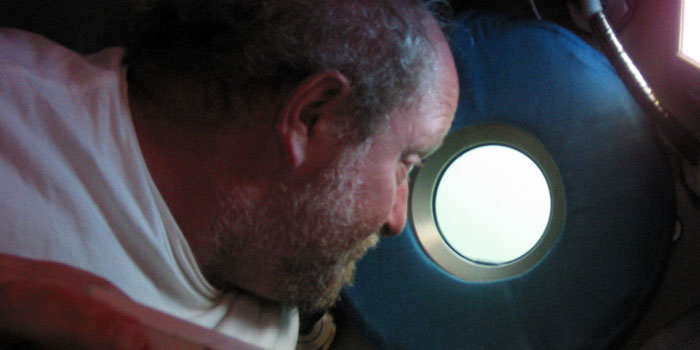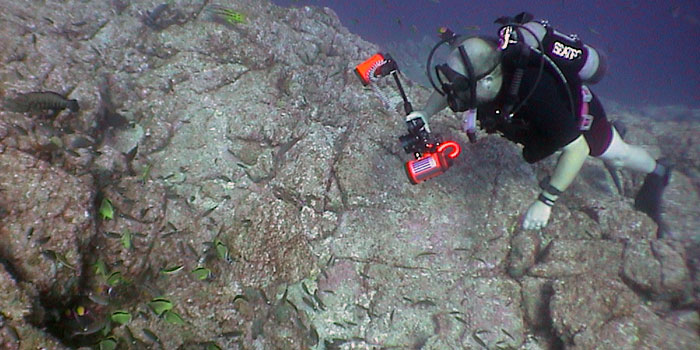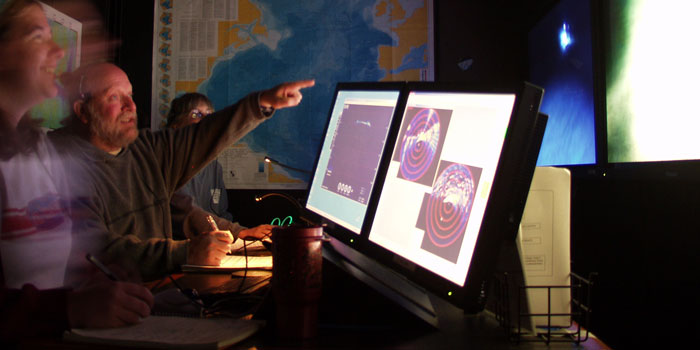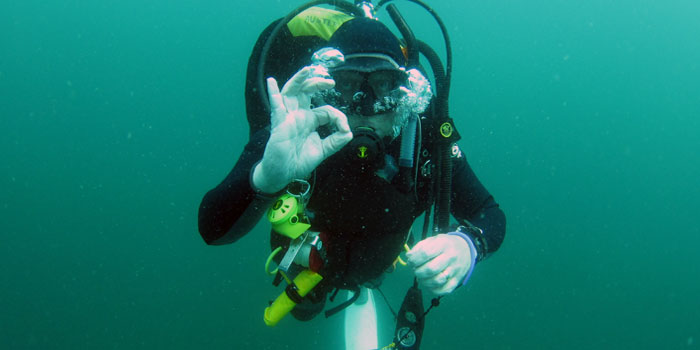Dr. Peter Auster: Video Transcript
Hear Peter talk about his job and what it's like to conduct science while at sea. Download (mp4, 303 MB).
Introduction
My name is Peter Auster. I'm an associate research professor in the department of marine sciences and a science director for the National Undersea Research Center at the University of Connecticut. My job is very diverse. I conduct research on the ecology of fishes. I direct student research in the graduate program of the university and I aid in directing a undersea research program focused on research and exploration in the gulf of Maine and the Great Lakes. When I'm at sea, I'm generally leading the "fishy-part" of our expeditions. We often have multi disciplinary teams looking at things like... The current expedition, looking at things like corals and other invertebrates, and I'm focused on the ecology of fishes so I generally focus on that part of the work.
The thing I enjoy most about being at sea is actually being at sea. You get a view of the world that most people never get when they go into the office in the morning. There are beautiful landscapes, both above and below water depending where we're working. And even being out in storms, it's incredible to experience those forces of nature. Again, most people tend to either avoid of don't get to do when they're sitting in the office.

Peter talks about the value and the challenges of doing science while at sea.
Conducting Research at Sea
The primary task at sea all the time is trying to collect as much data as you can using the facilities that you have because going to sea is very expensive and often you spend 1 or two or three weeks at sea trying to collect the data that you're going to use the entire, rest of the year to get your research done. My role on the latest expedition was studying the ecology of... was dealing with the ecology of fishes part of the research. We had a very diverse and interdisciplinary group of scientists on the ship. Some with geophysics, others, many others, looking at the various components of ecology of corals and other invertebrates and I was the soul guy on board looking at animals with backbones.
There are a number of challenges at sea. One is simply just operating on the deck of the ship which is unlike anything you ever experience when you walk into the office in the morning. There are technical challenges using any kind of electronics in a marine environment as well as weather keeping it from getting your job done. I've had cruises that have totally been blown off by hurricanes that have moved through as well as technical difficulties from using very advanced, state of the art, under water vehicles and other kinds of tools.
We saw some incredible things on this expedition. This is the 3rd in a series of cruises focused on seamounts in the Western North Atlantic. And this time we were able to look at the Eastern part of the chain in the Corner Rise seamounts because we were able to start the expedition in the Azores in the Eastern Atlantic. And we spent nearly 11 days under water using the Hercules ROV and the landscapes were just other worldly. The landscape isn't like on land. It isn't populated by trees and shrubs and things. These landscapes are populated by corals and sponges and then we have the wildlife, the fishes, moving amongst them. We saw a number of species that we hadn't seen before. Many times this is the first time that light is falling on these species of fish and we're actually seeing them operating in their environment for the first time. Most of these species have been collected before but by nets. So we have this fish that's isolated from its environment flopping on the deck of a boat, or people study them dead in jars in museums. And these are all valuable intellectual pursuits, but actually seeing how these animals operate within their environment is both unique and gives us a picture on those things that are important to their life's history.

One of the best ways to study the ecology of fish is to actually get in the water and join them "at home."
Job Description
My job is focused on understanding the ecology of fishes and mostly just looking at the behavior of fishes in the environment in which they live. And we do this using scuba diving... snorkels and scuba diving, research submarines, remotely operated vehicles... actually getting into the environment where fish occur versus looking at the fish coming up in the net or in bottles back in the laboratory. Then after we go and collect this data mostly on video, we spend a lot of time in the laboratory analyzing the video to produce data that we use for conducting various statistical tests, writing papers for journals, writing proposals. I also help lead the undersea research center here at the university.
The national undersea research center, here at the University of Connecticut, is one of six undersea centers funded by the national undersea program and that's part of NOAA. What we do is provide advanced diving technologies to the regional science community. Here our region is the Southern New England Continental Shelf, Georgia's Bank, Gulf of Maine, and The United State's Great Lakes. And we use research submarines, remotely operating vehicles, and mixed gas diving to support research of many scientists. Some of my research is focused on the basic ecology of fishes. Fundamental research on how these animals evolve, how they interact with one another and their environment. That leads to two very applied areas. One is understanding the roles that fishing plays... the impacts of fishing on fish populations and communities. And then also, the potential role that marine reserves might play as a way to conserve and substantially use marine biological diversity.
Exploring seamounts in the North Atlantic has been an incredible opportunity and probably one of the best opportunities I've had in my 20 years conducting research because we get to go explore. Most research is very focused on testing a hypothesis and collecting data for particular theories and hypothesis where here our job is to go out and look and see who's there. We're the first group of people doing an ecology exploration of the seamounts in the North Atlantic.
The data that we are creating are focused on looking at where corals are in the environment and where the co-occurring fishes are. Fishes are generally much more spread out over the seamounts and looking for statistical associations between corals and fishes depends on how much coral there is that's available. If corals are important for fishes, we'll find many fishes clumped in aggregations of coral. If there are no associations, then they might be more widespread. Some individuals might be in coral, others not. But we need to create that matrix of data in order to be able to test that.

Video is data, too, and close analysis of underwater video footage can tell scientists a great deal about the ecology and behavior of fish.
Data Collection
We used Hercules and Argus as flying video cameras. Uniquely, both vehicles have high-definition video which gives us incredible resolution to be able to identify fishes and make video records of their behaviors. We weren't able to collect the fish. Hercules isn't set up to be able to chase and capture fishes. Although there were a couple we would have liked to have been able to catch just in terms of identification. But it's really doing observational wildlife biology under water. The operations van is mission control for any dive. There's a watch leader. I served as a watch leader, one of 3 watches, and that's where we worked with the pilots and two other scientists to collect all the data for all the different projects that are being done as part of this expedition. Things were often very collaborative. If we saw something that was unique, scientist who had monitors in the lab would often come into the operations van and talk about strategy for trying to collect an organism or be able to run the ROV for collecting video or still image data. But then it was up to the watch leader to communicate that to the pilot... the Hercules pilot, the Argus pilot, and the navigator.
At the end of the dive, Hercules would get back on deck, hauled back out of the water, and then we would go trough... There were people called the "bucket brigade" because had a number of containers on the ROV that had all the specimens that we collected during the dive. And so everybody pitched in and schlepped specimens back to the pool room where the people that were working on those specimens would then work in the lab. My specimens... my collections, were actually the video and the high-definition stills that were collected during the dive. So after the bucket brigade, while most people worked in the lab, I'd get those image files off the server, the computer server that's connected to Hercules, and begin to go through the process of attempting to identify the individual fish species that we saw during the dive. That enables us, once we're back here in the lab, to begin to piece together their distribution over the seamounts.
What we've done on this expedition is a work in progress. We've collected all the video, now what we need to do is actually produce data from that video and conduct statistical analysis to look at whether there really are significant association between some species of fish and corals. The verdict is still out on their importance even for some species of fish.

Peter offers advice for young people wishing to enter the ocean realm as a career.
Closing Remarks
My advice to students who want to become ecologists or marine biologists or oceanographer is keep that brass ring in mind and go out and get lots of experience. My first job, I think I made $7,000 a year, but I got to go dive all the time. And I did things like chasing whales around as part of a citation population assessment project and I went to sea as a fishery observer in the Gulf of Alaska in the Bering Sea and got lots of experience in the field and that was even more important than the experiential part of a potential employer knowing that I could go to sea. Being able to go out and do these things, maybe think about interesting questions about the nature of fish communities and populations and... I also didn't get all my degrees right away. I got my bachelor's degree then I worked for 5 years. Then I went back and got my masters; worked for a long time and then I got my PhD even a little later in life. But all these things gave me valuable experience about how things operate in nature and it just gave me a slue of questions that two or three careers couldn't begin to answer. So there are just lots of unknowns out in the ocean; the least explored part of our planet. And on top of that, just that basic desire to explore is the more practical issue to conserving biological diversity. As the human population grows we need more and more smart people who can gain new insights into how the ocean works and animals that live within it work and how we'll be able to conserve these as human needs grow to exploit different parts of the ocean.
I think my most memorable dive was on the Great Barrier Reef off in Northeastern Australia sitting amongst all these predators feeding on reef fishes. Large Jackson and a Bluefin Trevally and sharks and it was probably one of the most complete communities I've ever seen besides communities of fish in the deep sea that tend to be more spread out, but just the number and diversity of the fish on that spot on the great barrier reef was incredible. And the ability to go see something like that is getting more and more rare as people adventure out and exploit more areas in the ocean and the fact that the Australian government had the wisdom to make that part of the Great Barrier Reef marine park and protect those areas just made it an incredible experience.
One of the most inspirational quotes comes from Baba Dioum who was a Senegal ecologist who said, "In the end we will conserve only what we love. We will love only what we understand. And we will understand only what we are taught." And I've got this incredible opportunity in my career to gain new knowledge about marine biological diversity and apply that to conservation needs in both local... regional and global scales.
Return to profile